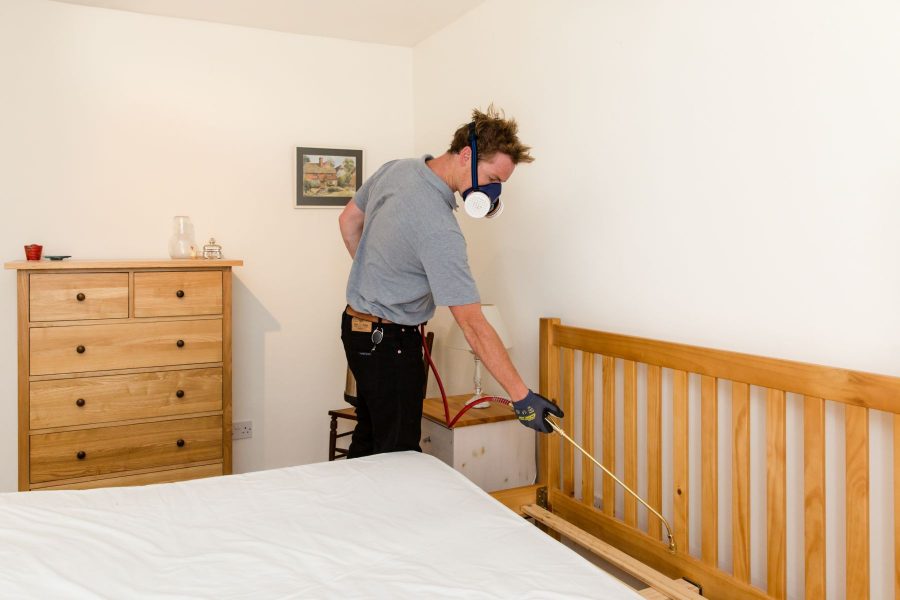Expert Kings Pest Control Cincinnati: Your Trusted Exterminators
Expert Kings Pest Control Cincinnati: Your Trusted Exterminators
Blog Article
A Break Down of the Different Types of Parasite Control Solutions
In the world of insect control, a multitude of approaches exist to attend to and fight the visibility of unwanted animals. As we navigate with the diverse landscape of bug control services, recognizing the intricacies of each approach becomes extremely important in identifying the most effective program of activity.
Chemical Pesticides
Chemical pesticides are generally utilized in insect control to efficiently eliminate a large range of pests and various other bugs. These chemicals work by targeting the nerves of the parasites, disrupting their regular features, and eventually bring about their demise. Making use of chemical pesticides has actually been a staple in the insect control sector for years due to their performance and fast results.

Nonetheless, it is vital to make use of chemical pesticides with care because of their potential harmful results on the atmosphere and non-target species. Inappropriate application or overuse of these chemicals can result in pollution, injury to useful insects, and resistance growth in insect populations. It is critical to adhere to security guidelines and laws when utilizing chemical pesticides for pest control.
Biological Control Techniques
Taking into consideration the potential ecological impacts and dangers related to chemical pesticides, biological control techniques use an even more sustainable method to handling parasite populations. Biological control includes making use of all-natural adversaries, such as parasites, killers, and virus, to suppress bug populaces. This technique is usually more targeted, affecting only the specific insect species while reducing damage to valuable pests, human beings, and the setting.

One benefit of biological control is its lasting efficiency. As soon as established, all-natural enemies can assist control pest populations continually without the requirement for duplicated applications of chemicals. Additionally, organic control is typically more economical and can help minimize chemical resistance in pest populaces gradually. In general, organic control methods provide a eco friendly and sustainable option to pest monitoring.

Mechanical Insect Control
Mechanical parasite control includes the physical adjustment or removal of insects to manage their populaces effectively. One usual instance of mechanical insect control is utilizing traps to record insects or rats.
An additional mechanical approach is using obstacles such as webs, fences, or screens to block parasites from going into details areas. By physically avoiding bugs from accessing an area, the probability of problems or damage can be dramatically minimized. In addition, hands-on methods like handpicking parasites off plants or structures can be effective for smaller-scale invasions.
While mechanical parasite control techniques can be labor-intensive, they supply a non-chemical alternative that can be eco-friendly and lasting. By targeting bugs directly, mechanical control strategies can help keep bug populations in check without counting on pesticides.
All-natural Solutions
Using natural solutions for pest control supplies a eco-friendly and lasting technique to taking care of pest populaces without turning to chemical treatments. All-natural solutions involve using substances obtained from plants, minerals, or other naturally occurring sources to prevent or get rid of bugs. For example, growing particular natural herbs like basil, mint, or lavender around blog your home can repel insects due to their solid aromas. Diatomaceous planet, a powder made from fossilized algae, can be utilized to fight insects like ants, cockroaches, and bed bugs by dehydrating their exoskeletons.
Furthermore, vital oils such as tea tree oil or neem oil have insecticidal residential properties that can successfully control parasites while being risk-free for the environment. An additional natural solution is introducing advantageous insects like ladybugs or hoping mantises to your garden to exploit damaging pests. here By including these natural remedies into parasite administration strategies, individuals can reduce their reliance on artificial chemicals and promote a much healthier, much more well balanced community.
Integrated Parasite Management
Integrated Bug Management (IPM) is a thorough approach that integrates various techniques to successfully control pest populaces while decreasing risks to human wellness and the environment. IPM involves the combination of numerous insect control techniques such as organic control, habitat control, adjustment of cultural techniques, and making use of resistant plant selections. By utilizing a combination of these methods, IPM intends to lower reliance on chemical pesticides, which can have negative effects on ecological communities and human health.
One key facet of IPM is the emphasis on prevention. By applying measures to avoid bug problems prior to they take place, such as keeping proper sanitation and sealing entry factors, the demand for responsive parasite control measures is minimized. Monitoring and regular inspections play a vital duty in IPM, permitting very early discovery of bug problems and punctual intervention.
Final Thought
To conclude, the different sorts of insect control services provide a series of options for effectively managing parasite problems. Chemical chemicals supply fast obliteration yet might have environmental threats. Organic control techniques use natural killers to regulate parasites. Mechanical bug control includes physical barriers or catches. All-natural remedies offer safe options. right here Integrated Insect Management incorporates several techniques for a holistic strategy to pest control. Each approach has its own advantages and disadvantages, and choosing one of the most proper service relies on the certain insect trouble available.
Chemical pesticides are generally utilized in parasite control to efficiently remove a broad variety of insects and other parasites.Mechanical parasite control involves the physical control or elimination of insects to handle their populaces efficiently (Kings cincinnati pest control companies).Utilizing natural solutions for parasite control provides a sustainable and environment-friendly approach to managing insect populaces without resorting to chemical treatments.Integrated Parasite Monitoring (IPM) is a comprehensive method that integrates different approaches to properly regulate pest populations while lessening dangers to human health and wellness and the setting.In conclusion, the different types of bug control services provide a variety of choices for properly managing pest infestations
Report this page